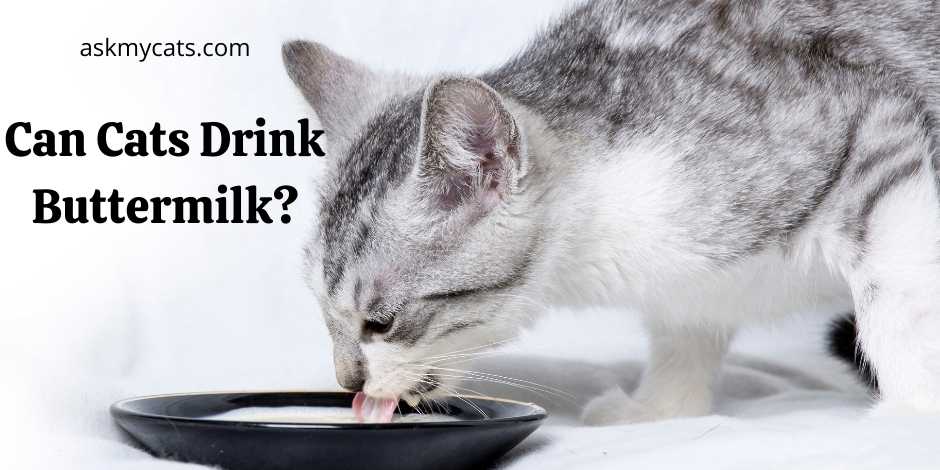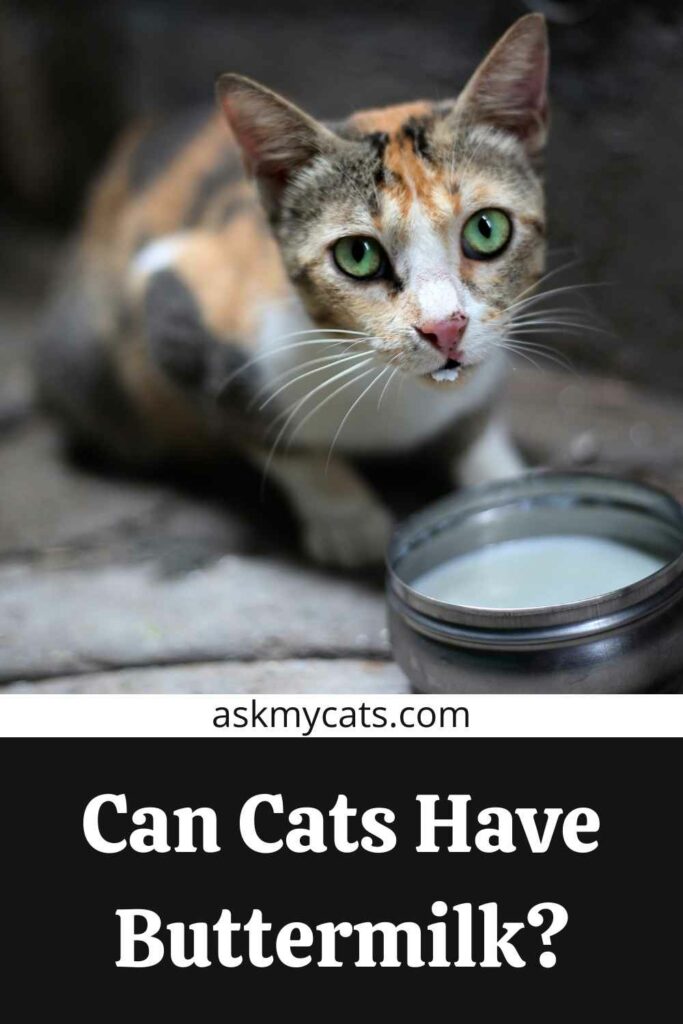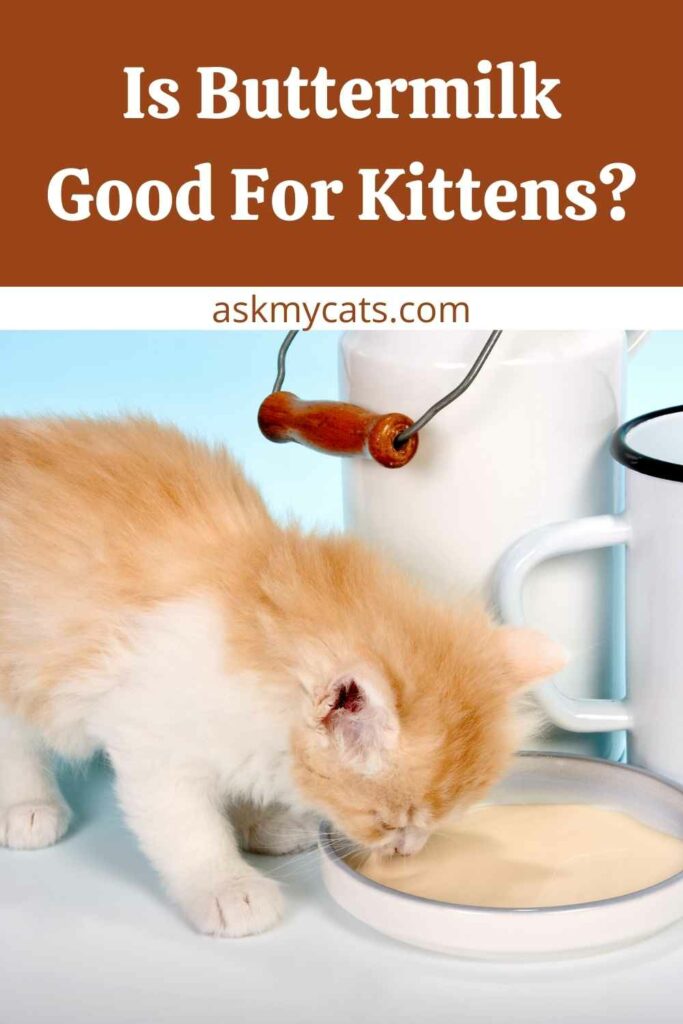Milk was thought to be good for cats for a long time. All you have to do is search through a collection of children’s picture books to find a plethora of photos of cats happily sipping milk. Scientific research, on the other hand, has prompted opinions to shift in recent years. Milk is no longer regarded as a nutritious beverage for cats.
Buttermilk should not be consumed by adult cats since it contains lactose. Lactose intolerance affects the majority of cats, causing gastrointestinal issues if they ingest lactose-containing items.
You may prepare lactose-free buttermilk, use cat-specific milk, or give a nutritious kitty treat as an alternative.
This article will explain why cats should avoid buttermilk and what they should eat instead.


Give Your Cat the Perfect Day
Get the Free Ebook!
Can Cats Have Buttermilk?
Cats should not drink buttermilk.

Although not all cats are lactose intolerant, the great majority of adult cats are.
The milk of a mother cat is extremely nutritious for kittens and is essential for their growth and development. Lactose intolerance does not exist in kittens who are still fed by their mothers since their bodies still contain lactase, the enzyme responsible for breaking down lactose in milk.
Lactose is the main complex carbohydrate found in milk and sugar. To be digested properly by a mammal, it must first be broken down into smaller sugars.
Lactase levels in a kitten’s body begin to decline shortly after weaning and eventually decrease altogether.
Lactase is lost at a different rate in different kittens, and a tiny percentage of adult cats still have low lactase levels.
Because most adult cats are lactose intolerant or have low lactase levels, there’s a good risk they’ll have stomach issues if they ingest dairy products. It’s unusual to come across a cat that can comfortably digest lactose-containing foods.
Offer one tablespoon of milk or buttermilk to your adult cat to see if he or she is lactose intolerant. If they don’t exhibit any indications of gastrointestinal difficulties after 24 hours, they can definitely take a tiny quantity of dairy on occasion as a treat.
Even in cats that aren’t lactose intolerant, most veterinarians don’t advocate it. Buttermilk and other dairy products lack the critical elements that your cat requires for good health and should not be included in their normal diet.
If you mean cats in general, I recommend finding out whether or not YOUR cats can digest milk. See what happens if you give them a tablespoon.
If they can’t digest anything, they’ll either vomit it up (vomiting isn’t a huge concern; cats’ digestive systems are intended to simply expel anything that isn’t good for them, and they don’t feel ill) or create liquid stinking poo.
If this happens, you’ll know they’re allergic to milk, so don’t feed them any more milk, fermented or not. If they don’t have any difficulty digesting it, you can offer them dairy products in any way they choose.
Is Buttermilk Good For Kittens?
Kittens can digest lactose; therefore they can be fed little amounts of buttermilk as a rare treat.

The majority of buttermilk on the market now isn’t the historic form, which was a by-product of the butter churning process and was never pasteurised.
Only India, Nepal, and Pakistan still produce traditional buttermilk.
Water, milk protein (or casein), and lactose make up the majority of modern buttermilk. Although buttermilk includes protein, which is an important food for cats, the amount of protein in it is insufficient to make it nutritious.
A cup of buttermilk usually has 9 g (0.31 oz.) of protein, but a cup of high-quality cat chow has over 30 g (1.05 oz.) of protein.
Lactose content in buttermilk is normally between 9 and 12 grams (0.31 and 0.42 oz.) per cup, similar to the lactose content in one cup of whole, low-fat, or skim milk, which is between 9 and 14 grams (0.31 and 0.49 oz.).
It’s generally homogenised, which means the fat particles have been emulsified into a creamy consistency.
In addition, contemporary buttermilk is usually pasteurised and supplemented with beneficial gut bacteria such as Lactobacillus bulgaricus or Lactococcus lactis. Buttermilk has a distinct sour flavour because to the microorganisms that ferments it.
Buttermilk bacteria also create lactic acid, which raises the acidity of the food to inhibit harmful bacterial development and lengthen its shelf life.
Buttermilk has a significantly creamier flavour and a thicker consistency than ordinary milk. Most cats are drawn to it because of its creaminess.
Kittens, on the other hand, require milk to maintain their health. When a kitten no longer has a mother, you can give it powdered milk that you mix with water. We’ve milked a number of kittens in the previous several years, both bottle-fed and bowl-fed.
We use KMR milk when we feed milk to kittens. KMR has a unique formula that does not include lactose. KMR milk is essentially laboratory-made mother milk that has all of the nutrients that a developing cat requires. KMR also creates milk that you may feed to your adult cats if they have a strong desire for it.
That manner, you may safely administer milk to your cat without risking fatal dehydration and vomiting spells.
Specially developed cat treats, which normally have the hazardous components eliminated or reduced and are frequently fortified with certain critical nutrients, are an alternative to offering human dairy products. Even such treats, though, should be consumed in moderation.
A well-balanced food and plenty of water are essential for a healthy, happy, and flourishing kitten.
What Happens When Cats Consume Buttermilk?
Within 12 hours of consuming buttermilk, cats are likely to develop gastrointestinal problems. Abdominal discomfort, diarrhoea, and vomiting are some of the symptoms.
If your cat is a kitten or one of the few adult cats that isn’t lactose intolerant, they won’t have any issues.
Because buttermilk has a similar lactose level to ordinary milk, you should avoid giving it to your cat if he or she is lactose intolerant as an adult.
What To Give Cats in Place of Buttermilk?
Homemade, lactose-free buttermilk and milk created specifically for cats are excellent alternatives to buttermilk. These buttermilk substitutes should only be given on rare occasions since they are deficient in nutrients for cats.
When cat owners discover that their cat like dairy items (including buttermilk), they are sometimes irritated. However, dairy should be avoided because most cats are lactose intolerant.
The good news is that there are lactose-free buttermilk alternatives. Mix one cup lactose-free milk with one teaspoon lemon juice or white vinegar to produce your own lactose-free buttermilk. Stir the mixture for a few minutes to ensure that all of the ingredients are properly incorporated.
After letting it sit for ten minutes, you’ll have a nice buttermilk alternative that your cat can drink.
Many cat food producers now provide lactose-free milk, which is specifically designed for cats. These goods are safe to give to your cat as a treat on occasion. These items are available for purchase at most pet shops and supermarket stores.
Despite the fact that lactose-free buttermilk and cat milk products are safe for cats, most veterinarians advise only giving them to cats on rare occasions or not at all.
Consider replacing buttermilk with a healthier option if you’ve been giving your cat buttermilk as a treat. There are a variety of nutritional cat snacks that are not only tasty but also perfectly safe for cats to eat.
Consult your veterinarian if you’re not sure which treat is best for your cat. They’ll be able to suggest a tasty, nutritional treat for your cat, as well as how often it should be given.
Frequently Asked Questions
What can I give my cat instead of cat milk?
Fresh, clean water is all that cats will ever require. If you want to offer your cat milk, you may get lactose-free cow’s milk (lactose is the sugar contained in milk) from your pet store, vet, or supermarket; some even have extra vitamins and minerals.
Is butter poisonous to cats?
While fat is an important element of your cat’s diet, some cats do not take it well, which can lead to stomach distress and pancreatitis. Cats appear to have developed a taste for butter. Its fine to offer it to her if she tolerates it, but don’t let her abuse it.
Can a cat get sick from eating butter?
No, butter isn’t dangerous to cats, and your kitty won’t get sick or die if they eat the butter you left out on the counter. The most serious concern with cats with butter is starvation, not lactose intolerance or hairballs.
Final Words
Buttermilk should not be given to adult cats since they are lactose intolerant.
Give your adult cat a spoonful of buttermilk (or another dairy product) and observe their reaction for 24 hours to see whether they are lactose intolerant. They’re definitely lactose intolerant if they have diarrhoea or other gastrointestinal issues.
If you have any questions unanswered, please leave it in the comments section below.
